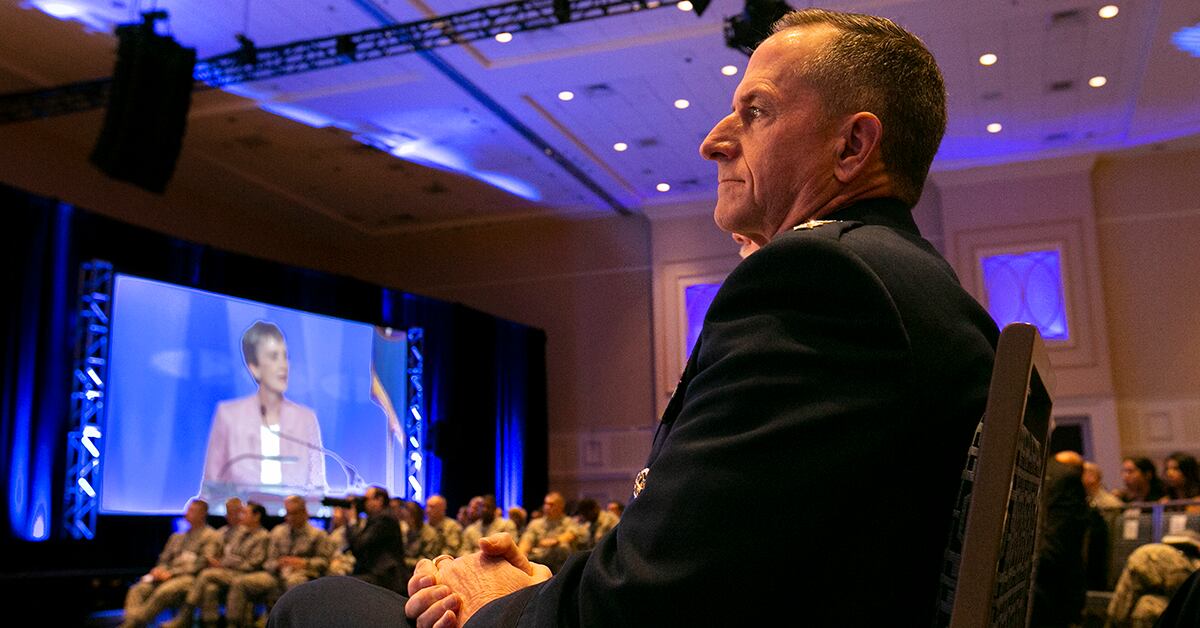A possible conflict with a major nation such as China, Russia or North Korea could bring “casualties, degradation of capabilities, [and] shortfalls the likes of we’ve never seen, at least in our lifetime,” Chief Master Sergeant of the Air Force Kaleth Wright said Wednesday.
To handle the possibility of a devastating conflict, the Air Force needs to build “hybrid airmen” who are able to take on multiple roles, Wright said at the Air Force Association’s Air, Space, Cyber Conference.
The Air Force shouldn’t go so far as to make airmen generalists, Wright said. But neither can it afford for them to be so specialized that they can’t take on another airman’s role if a conflict inflicts serious damage on their units, he said.
Wright’s comments about “the airmen we need” tied in with Air Force leadership’s call to get the service ready for the possibility of a conflict with a “great power” nation such as China or Russia. The National Defense Strategy laid out by the Pentagon earlier this year called for refocusing the military’s attention on preparing for such a major conflict, and away from conflicts like the battles against violent extremist groups, such as the Taliban and the Islamic State, over the past 17 years.
Air Force Secretary Heather Wilson on Monday unveiled a proposal called “The Air Force We Need,” to grow the Air Force’s operational squadrons from 312 to 386 by 2030 to meet that challenge. This 24 percent growth would likely require 40,000 more active, Guard and Reserve airmen and civilian employees, though other details on how it would happen remain to be hammered out over the next six months.
Wright said the Air Force needs to think differently about how it develops airmen, to create more agile service members.
“Traditionally, we have a specialist kind of mentality in how we develop” airmen, Wright said. "Grow in one career field, and remain a specialist in what you do. Imagine a world where more of us were like crew chiefs than specialist mechanics.”
RELATED

Addressing airmen’s concerns
Wright also said airmen need to be well-trained, well-led and resilient as the Air Force shifts its focus.
As part of the effort to make sure airmen are well-led, Wright said Air University is in the process of revamping all levels of enlisted professional military education to add more emphasis on readiness, lethality and joint operations.
And in a panel discussion Tuesday with Wilson, Chief of Staff Gen. Dave Goldfein, and their spouses, Wright addressed the possibility of extending high year of tenure limits for some enlisted ranks.
Wright said he expects that an extension of so-called “up or out” rules — which govern when an airman must separate if not promoted to a higher rank — would cover about 1,200 airmen each year.
As a result, he’s not concerned that high year of tenure changes will result in some career fields becoming overmanned, or that it would create promotion logjams for younger airmen moving up the ranks.
Wright expects staff sergeants, who would likely see their high year of tenure extended from 15 to 20 years, would be the biggest beneficiaries of the changes.
But, he cautioned, the extension won’t be a free pass for underperforming airmen to skate by for five more years or so.
“It’s more like a passport than a ticket," Wright said. "It won’t just be automatic. Commanders will still have all the tools available to them if people need to separate from the Air Force. There’s probably a group of them who, there’s a reason why they haven’t been promoted yet, and probably need to transition.”
Wright said he hopes to get the changes done soon.
Stephen Losey is the air warfare reporter for Defense News. He previously covered leadership and personnel issues at Air Force Times, and the Pentagon, special operations and air warfare at Military.com. He has traveled to the Middle East to cover U.S. Air Force operations.




